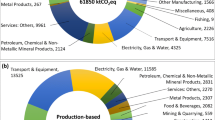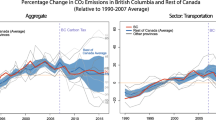Abstract
The Paris agreement is a legally binding international treaty on climate change. This study examines the Paris agreement and other explanatory variables such as net energy imports, and consumption of three significant fossil fuel impacts on carbon dioxide (CO2) emissions in three selected European countries, including Germany, Spain, and France. We employed fully modified OLS (FMOLS) and dynamic OLS (DOLS) regression methods to evaluate the effects based on panel data from 1995 to 2019. The results suggest that the impact of the Paris agreement is negligible. According to the FMOLS model, the Paris agreement reduces CO2 emissions by roughly 1%. It seems that the Paris agreement is less effective than it was hoped to be. For consumption of three primary fossil fuels and net energy import effects on the CO2 emissions, the results are as expected to be because any increase in the parameters will grow in carbon dioxide emissions in both models. It is worth mentioning that the most crucial factor in CO2 emissions is the crude oil consumption that has an immense impact on both models. In the other words, a 1% increase in the usage of crude oil will release 0.56% CO2 in the atmosphere.
Graphical abstract






Similar content being viewed by others
Notes
Foreign direct investment.
The Middle East and North Africa countries.
Fully Modified Ordinary Least Squares.
Dynamic Ordinary Least Squares Model.
Augmented Dickey-Fuller.
References
Abas N, Kalair A, Khan N, Kalair A (2017) Review of GHG emissions in Pakistan compared to SAARC countries. Renew Sustain Energy Rev 80:990–1016
Ahmad N, Du L (2017) Effects of energy production and CO2 emissions on economic growth in Iran: ARDL approach. Energy 123:521–537
Baek J (2016) Do nuclear and renewable energy improve the environment? Empirical evidence from the United States. Ecol Ind 66:352–356
Beck N, Katz JN (2011) Modeling dynamics in time-series–cross-section political economy data. Annu Rev Polit Sci 14:331–352
Bekun FV, Alola AA, Sarkodie SA (2019) Toward a sustainable environment: Nexus between CO2 emissions, resource rent, renewable and nonrenewable energy in 16-EU countries. Sci Total Environ 657:1023–1029
Bhattacharya M, Churchill SA, Paramati SR (2017) The dynamic impact of renewable energy and institutions on economic output and CO2 emissions across regions. Renewable Energy 111:157–167
Bloch H, Rafiq S, Salim R (2012) Coal consumption, CO2 emission and economic growth in China: empirical evidence and policy responses. Energy Economics 34(2):518–528
BMU (2020) Climate action plan 2050. Retrieved from https://www.bmu.de/WS3915-1
Caglar AE (2020) The importance of renewable energy consumption and FDI inflows in reducing environmental degradation: bootstrap ARDL bound test in selected 9 countries. J Clean Prod 264:121663
Ciupăgeanu D-A, Lăzăroiu G, Tîrşu M (2017) Carbon dioxide emissions reduction by renewable energy employment in Romania. Paper presented at the 2017 International Conference on Electromechanical and Power Systems (SIELMEN)
CLEW (2021) Germany’s greenhouse gas emissions and energy transition targets. Retrieved from https://www.cleanenergywire.org/factsheets/germanys-greenhouse-gas-emissions-and-climate-targets
ClimateTransparency (2018) Brown to Green Report 2018. Retrieved from https://www.climate-transparency.org/wp-content/uploads/2019/01/BROWN-TO-GREEN_2018_France_FINAL.pdf
ClimateTransparency (2020) Climate Transparency report comparing G20 climate action and responses to the Covid-19 crisis. Retrieved from https://www.climate-transparency.org/wp-content/uploads/2020/11/France-CT-2020.pdf#page=10
Duarte R, Sánchez-Chóliz J, Sarasa C (2018) Consumer-side actions in a low-carbon economy: a dynamic CGE analysis for Spain. Energy Policy 118:199–210
Erdal H, Erdal G (2020) Panel FMOLS model analysis of the effects of livestock support policies on sustainable animal presence in Turkey. Sustainability 12(8):3444
Ferreira A, Pinheiro MD, de Brito J, Mateus R (2019) Decarbonizing strategies of the retail sector following the Paris Agreement. Energy Policy 135:110999
Hassan MK, Sanchez B, Yu J-S (2011) Financial development and economic growth: new evidence from panel data. Q Rev Econ Finance 51(1):88–104
Haug AA, Ucal M (2019) The role of trade and FDI for CO2 emissions in Turkey: nonlinear relationships. Energy Econ 81:297–307
Hill RC, Griffiths WE, Lim GC (2018) Principles of econometrics. Wiley, Hoboken
IEA (2019) (Internatianal Energy Agency) (2019) World energy outlook
2019, International Energy Agency (IEA). OECD, Paris
Jebli MB (2016) On the causal links between health indicator, output, combustible renewables and waste consumption, rail transport, and CO 2 emissions: the case of Tunisia. Environ Sci Pollut Res 23(16):16699–16715
Kahia M, Jebli MB, Belloumi M (2019) Analysis of the impact of renewable energy consumption and economic growth on carbon dioxide emissions in 12 MENA countries. Clean Technol Environ Policy 21(4):871–885
Kalmaz DB, Kirikkaleli D (2019) Modeling CO 2 emissions in an emerging market: empirical finding from ARDL-based bounds and wavelet coherence approaches. Environ Sci Pollut Res 26(5):5210–5220
Kao C (1999) Spurious regression and residual-based tests for cointegration in panel data. J Econom 90(1):1–44
Khan MK, Teng J-Z, Khan MI, Khan MO (2019) Impact of globalization, economic factors and energy consumption on CO2 emissions in Pakistan. Sci Total Environ 688:424–436
Li S, Zhou C, Wang S (2019) Does modernization affect carbon dioxide emissions? A panel data analysis. Sci Total Environ 663:426–435
Liobikienė G, Butkus M (2017) The European Union possibilities to achieve targets of Europe 2020 and Paris agreement climate policy. Renew Energy 106:298–309
Liu W, McKibbin WJ, Morris AC, Wilcoxen PJ (2020) Global economic and environmental outcomes of the Paris Agreement. Energy Econ 90:104838
Luqman M, Ahmad N, Bakhsh K (2019) Nuclear energy, renewable energy and economic growth in Pakistan: evidence from non-linear autoregressive distributed lag model. Renew Energy 139:1299–1309
Maibach E, Miller J, Armstrong F, El Omrani O, Zhang Y, Philpott N, Atkinson S, Rudoph L, Karliner J, Wang J (2021) Health professionals, the Paris agreement, and the fierce urgency of now. J Clim Change Health 1:100002
Månsson K, Kibria B, Shukur G, Sjölander P (2018) On the estimation of the CO2 emission, economic growth and energy consumption nexus using dynamic OLS in the presence of multicollinearity. Sustainability 10(5):1315
Martins F, Felgueiras C, Smitkova M, Caetano N (2019) Analysis of fossil fuel energy consumption and environmental impacts in European countries. Energies 12(6):964
Menyah K, Wolde-Rufael Y (2010) CO2 emissions, nuclear energy, renewable energy and economic growth in the US. Energy Policy 38(6):2911–2915
Metz B, Davidson O, Bosch P, Dave R, Meyer L (2007) Climate change 2007: mitigation of climate change. Cambridge Univ. Press, Cambridge
Michalski MŁ (2019) Development of nuclear power as an alternative to fossil fuels. Acta Innov. https://doi.org/10.32933/ActaInnovations.30.5
Mousavi B, Lopez NSA, Biona JBM, Chiu AS, Blesl M (2017) Driving forces of Iran’s CO2 emissions from energy consumption: an LMDI decomposition approach. Appl Energy 206:804–814
Nathaniel SP, Iheonu CO (2019) Carbon dioxide abatement in Africa: the role of renewable and non-renewable energy consumption. Sci Total Environ 679:337–345
Oberthür S, Groen L (2017) The European Union and the Paris Agreement: leader, mediator, or bystander? Wiley Interdiscip Rev Clim Change 8(1):e445
Ozturk I, Acaravci A (2010) CO2 emissions, energy consumption and economic growth in Turkey. Renew Sustain Energy Rev 14(9):3220–3225
Pedroni P (2001) Fully modified OLS for heterogeneous cointegrated panels. In: Nonstationary panels, panel cointegration, and dynamic panels. Emerald Group Publishing Limited.
Petroleum, B (2020) BP statistical review of world energy report. BP, London
Piłatowska M, Geise A, Włodarczyk A (2020) The effect of renewable and nuclear energy consumption on decoupling economic growth from CO2 emissions in Spain. Energies 13(9):2124
Rokni E, Panahi A, Ren X, Levendis YA (2016) Curtailing the generation of sulfur dioxide and nitrogen oxide emissions by blending and oxy-combustion of coals. Fuel 181:772–784
Rose SK, Richels R, Blanford G, Rutherford T (2017) The Paris Agreement and next steps in limiting global warming. Clim Change 142(1–2):255–270
Saboori B, Sulaiman J (2013) CO2 emissions, energy consumption and economic growth in Association of Southeast Asian Nations (ASEAN) countries: a cointegration approach. Energy 55:813–822
Sahir MH, Qureshi AH (2007) Specific concerns of Pakistan in the context of energy security issues and geopolitics of the region. Energy Policy 35(4):2031–2037
Saidi K, Omri A (2020) Reducing CO2 emissions in OECD countries: do renewable and nuclear energy matter? Prog Nucl Energy 126:103425
Sandiumenge Torres IY (2020) The Paris Agreement on climate change: breakthrough or dismal failure?
Schneider L, La Hoz Theuer S (2019) Environmental integrity of international carbon market mechanisms under the Paris Agreement. Clim Policy 19(3):386–400
Shahbaz M, Kablan S, Hammoudeh S, Nasir MA, Kontoleon A (2020) Environmental implications of increased US oil production and liberal growth agenda in post-Paris Agreement era. J Environ Manag 271:110785
Siddique HMA, Majeed DMT, Ahmad DHK (2020) The impact of urbanization and energy consumption on CO2 emissions in South Asia. South Asian Stud 31:2
UNFCC (2015) Paris agreement. Paper presented at the Report of the Conference of the Parties to the United Nations Framework Convention on Climate Change (21st Session, 2015: Paris). Retrived December.
Wang S, Zhou D, Zhou P, Wang Q (2011) CO2 emissions, energy consumption and economic growth in China: a panel data analysis. Energy Policy 39(9):4870–4875
Wang S, Fang C, Guan X, Pang B, Ma H (2014) Urbanisation, energy consumption, and carbon dioxide emissions in China: a panel data analysis of China’s provinces. Appl Energy 136:738–749
Worldbank (2013) Water is focus of climate changein Middle East and North Africa. Retrieved from http://web.worldbank.org/archive/website01418/WEB/0__C-151.HTM
Author information
Authors and Affiliations
Corresponding author
Additional information
Publisher's Note
Springer Nature remains neutral with regard to jurisdictional claims in published maps and institutional affiliations.
Rights and permissions
About this article
Cite this article
Rezaei Sadr, N., Bahrdo, T. & Taghizadeh, R. Impacts of Paris agreement, fossil fuel consumption, and net energy imports on CO2 emissions: a panel data approach for three West European countries. Clean Techn Environ Policy 24, 1521–1534 (2022). https://doi.org/10.1007/s10098-021-02264-z
Received:
Accepted:
Published:
Issue Date:
DOI: https://doi.org/10.1007/s10098-021-02264-z




